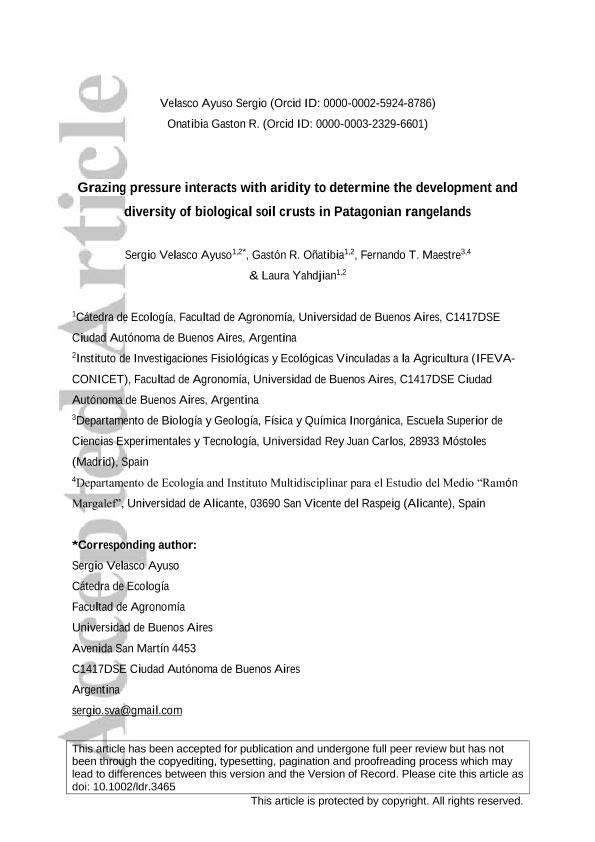Artículo
Grazing pressure interacts with aridity to determine the development and diversity of biological soil crusts in Patagonian rangelands
Fecha de publicación:
10/2019
Editorial:
John Wiley & Sons Ltd
Revista:
Land Degradation & Development
ISSN:
1085-3278
Idioma:
Inglés
Tipo de recurso:
Artículo publicado
Clasificación temática:
Resumen
Grazing is directly related to land degradation and desertification in global drylands. Grazing impacts on vascular plants, reasonably well-known, depend on its intensity and are modulated by local aridity conditions. However, we do not know how the interplay of grazing intensity and aridity affect biocrusts, topsoil assemblages dominated by cyanobacteria, lichens, and mosses that provide key ecosystem services in drylands. Here, we determined how grazing affects biomass, total cover, and richness of biocrust structural types across a regional aridity gradient in the Patagonian steppe. On average, grazing by sheep reduced biocrust biomass, total cover and richness of structural types by 55, 90, and 59%, respectively. In general, high grazing pressures had a larger impact on biocrusts than moderate or light grazing pressures. For example, biocrust cover was reduced by 85, 89, and 98% by light, moderate, and high grazing pressures, respectively. Although a slightly different response to grazing was observed under low aridity conditions, these more benign climatic conditions did not compensate for the negative effects of trampling by domestic animals on biocrusts. Nonetheless, estimated biocrust recovery rates under medium aridity conditions were faster than previously thought: it took 24, 18, and 58 years to double biocrust biomass, total cover, and richness of structural types. Sheep cannot be just removed in Patagonian rangelands because the production of meat and wool represents the main local economic activity. But landowners must consider our results to protect the ecosystem functions and services provided by biocrusts for future generations to come.
Palabras clave:
ARIDITY
,
BIOCRUSTS
,
GRAZING INTENSITY
,
PATAGONIAN STEPPE
,
RECOVERY RATES
Archivos asociados
Licencia
Identificadores
Colecciones
Articulos(IFEVA)
Articulos de INST.D/INV.FISIOLOGICAS Y ECO.VINCULADAS A L/AGRIC
Articulos de INST.D/INV.FISIOLOGICAS Y ECO.VINCULADAS A L/AGRIC
Citación
Velasco Ayuso, Sergio; Oñatibia, Gastón Rafael; Maestre, Fernando T.; Yahdjian, María Laura; Grazing pressure interacts with aridity to determine the development and diversity of biological soil crusts in Patagonian rangelands; John Wiley & Sons Ltd; Land Degradation & Development; 31; 4; 10-2019; 488-499
Compartir
Altmétricas




